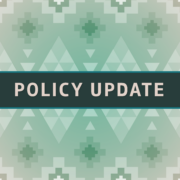Veterans Save $2.5 Million Thanks to Department of Veteran Affairs Copay Exemption Championed by NCUIH and Native Partner Organizations
On February 13, 2024, the Department of Veterans Affairs (VA) announced that it has exempted or reimbursed more than 143,000 copayments totaling approximately $2.5 million for more than 3,800 eligible American Indian and Alaska Native Veterans.
This comes less than a year after the VA implemented a final rule, championed by the National Council of Urban Indian Health (NCUIH), that exempts eligible American Indian and Alaska Native Veterans to make copayments for health care and urgent care received through VA ― making VA health care more accessible and affordable. Under this policy, VA also reimburses for copayments paid on or after January 5, 2022.
Learn more about copayment exemptions for Native American and Alaska Native Veterans and VA benefits and programs for American Indian and Alaska Native Veterans.
Background
The copayment exemption is a significant step to upholding the federal government’s trust responsibility to “maintain and improve the health of the Indians.” American Indians and Alaska Natives serve in the military at one of the highest rates of any group in the United States and many Native veterans receive healthcare from the Veterans Health Administration, an agency within VA, in addition to utilizing IHS, Tribal, and UIO facilities. Unfortunately, American Indian and Alaska Native Veterans generally have a higher prevalence of mental health disorders compared with White veterans, and among all veterans, the prevalence of suicidal ideation is highest for those reporting a diagnosis of depression, anxiety, or post-traumatic stress disorder. Further, an estimated 86.2 percent of American Indian and Alaska Native Veterans that live in urban areas generally have higher unemployment, lower education attainment, lower income, higher VA-service connected disability, and generally live in poorer housing conditions than non-Native Veterans also living in urban areas.
On April 4, 2023, VA published a final rule in the Federal Register establishing the waiver process for Veterans to submit documentation to have their VA copays waived. This rule implements Section 3002 of the Johnny Isakson and David P. Roe, M.D. Veterans Health Care and Benefits Improvement Act of 2020 Public Law 116-315, signed into law on January 5, 2021, which prohibits collection of a health care copayment by the Secretary of Veterans Affairs from an American Indian and Alaska Native Veteran who meets the definitions of “Indian” or “urban Indian” under the Indian Health Care Improvement Act (IHCIA).
NCUIH’s Role
NCUIH has championed this copayment exemption and continues to advocate for Native Veterans living in urban areas to ensure that they have access to the high-quality, culturally competent care that the country owes to them for their service because of the federal trust responsibility. In February 2023, NCUIH submitted comments to the VA in response to the then proposed rule on the copayment exemption for American Indian and Alaska Native Veterans, stressing our support for this long overdue federal action and the need throughout Indian Country. Because the proposed rule only required VA to cover the first three urgent care visits in a calendar year, NCUIH and partnering Native organizations strongly urged the VA to cover all urgent care visits needed by Indian or urban Indian Veterans, which the VA adopted in the final rule. Moreover, NCUIH stressed that Native Veterans are entitled to the copayment exemption because of the federal government’s responsibility to provide and support services for Native Veterans in fulfilment of the trust responsibility for health care provisions for all American Indians and Alaska Native people.
NCUIH is encouraged to see the impact this rule has made in Indian Country and we will continue to engage with the VA on issues related to American Indian and Alaska Native Veterans living in urban areas.






